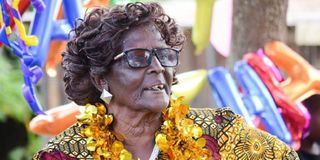I am aging but I will not stop my work

Ms Loise Towon at the past event. The State feted her for her immense contributions to harmonious co-existence among communities in Samburu. She is also actively involved in the fight against retrogressive cultural practices such as early marriages, beading and FGM.
What you need to know:
- Despite being threatened by the deep rooted cultural beliefs in her Samburu community, Ms Towon joined class with a group of men in early 1950s.
- She started sensitization programmes in Samburu villages to beat FGM.
- The government recognised her efforts; she was one of the people feted during the 2020 Mashujaa Day celebrations.
Many believe that Loise Towon Kimaneke, 79, was the first Samburu woman to join school in early 1950s.
Ancient semi-nomadic Maasai and Samburu herders exchanged their daughters for livestock by forcing underage girls to undergo female genital mutilation (FGM) before being married off. It is said the practice was rampant during a severe droughts that killed large numbers of animals, prompting parents to exchange girls for livestock.
Despite being threatened by the deep rooted cultural beliefs in her Samburu community, Ms Towon joined class with a group of men in early 1950s (she cannot remember exact year).
Competing academically with men made her a victorious voice, breaking centuries of silence besides opening path for Samburu girls to emulate her. She was enlightened and therefore, started movements aimed at transforming pain of Samburu women into a memory.
Finishing school was a crucial step in Ms Towon's journey because it allowed her to define her path. She devoted her life to leading the movement to end FGM in Samburu.
Sensitization programmes
Each year, thousands of girls and women across Samburu are at risk of undergoing FGM. The procedure is generally carried out on girls aged between eight and 15 years, and it has serious socio-economic, physical, emotional, sexual and health consequences, including death.
Ms Towon started sensitization programmes in Samburu villages to beat the retrogressive culture. She picked individuals and survivors of FGM to help in her quest.
"Survivors are always strengthened by their own experiences and positioned to unpack cultural nuances, re-shape narratives and find solutions to end FGM. The team helped me greatly,” says Ms Towon.
Recognizing the importance of a survivor-led movement to end FGM, she says: “We must support women and girls, especially survivors, to lead change and be role models to enlighten the Samburu community. Survivors speak from experience and when they speak, it touches her own people," she says.
Ms Towon says that despite the ban on FGM, the practice remains rampant in Samburu villages. She notes that the journey has been difficult as she has been threatened by community members for trying to go against norms and beliefs.
Heroic deeds
The anti-FGM crusader says the practice has prevailed due to lack of education on its negative effects.
"I used to go from house to house and talk to families on the importance of doing away with the practice. Some have abolished but others turn hostile and threaten my life," Ms Towon says.
The government recognised her efforts; she was one of the people feted during the 2020 Mashujaa Day celebrations for their contribution to societal growth through volunteering and heroic deeds.
The campaigner regretted that girls who undergo the cut in Samburu often drop out of school because the practice is interconnected with societal problems including forced marriage and beading.
The State awarded her for making immense contribution to peace and harmonious co-existence among the communities living in Samburu.
She worked with several government agencies to raise awareness in local villages about the harmful consequences of the traditional practice.
In 1992, Ms Towon represented women in Addis Ababa fourth Women Conference on FGM. She also represented Samburu women in the Beijing Conference of 1994.
She has been the lead in a mediation process between ethnic communities - Samburu, Pokot and Turkana, thus receiving several awards.
In 1979, she received Ambassador of Peace Award by the University of Nairobi and is the first woman from the region to receive Head of State Commendation (HSC) civilian division.
At 79 years of age, Ms Towon is still dreaming:
"I want a country where I wake up every morning and see the lives I have been able to change. I believe I have touched thousands of women and their families scattered across Samburu County and all over Kenya. I am aging but I am also not stopping," Ms Towon says.
She continues: "When I see girls graduating, I am a happy woman. I have helped Samburu women embrace diversity and tap national and county opportunities,"
She urges Samburu women to stand and fight for their rights.





